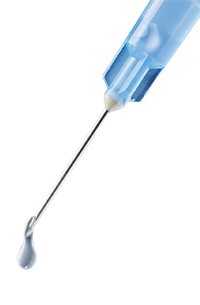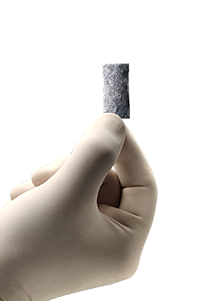BIOSKIN® Amniotic Wound Matrix
Thursday, August 20th, 2020AUGMENT® Injectable
Wednesday, September 19th, 2018VIAFLOW™ C Placental Tissue Matrix
Wednesday, October 26th, 2016OSTEOSET™ Resorbable Bead Kit
Wednesday, October 26th, 2016PRO-DENSE™ Bone Graft Substitute
Tuesday, October 25th, 2016TENSIX™ Demineralized Bone Matrix
Tuesday, October 25th, 2016Extremity Procedure Kit (EPK)
Tuesday, October 25th, 2016ALLOMATRIX™ Injectable DBM Paste
Tuesday, October 25th, 2016ALLOMATRIX™ DR DBM Putty with Large Cancellous Chips
Tuesday, October 25th, 2016ALLOMATRIX™ C DBM Putty with Small Cancellous Chips
Tuesday, October 25th, 2016AUGMENT® Bone Graft
Tuesday, September 15th, 2015VIAFLOW™
Thursday, August 6th, 2015 VIAFLOW™ & VIAFLOW™ C Placental Tissue Matrices are unique, pre-mixed, tissue matrix allografts, processed from human placental tissues. The fluid tissue combination contains collagens, growth factors, and other key biologic components.
VIAFLOW™ & VIAFLOW™ C Placental Tissue Matrices are unique, pre-mixed, tissue matrix allografts, processed from human placental tissues. The fluid tissue combination contains collagens, growth factors, and other key biologic components.
- Two configurations available > Ambient temperature (VIAFLOW™ ) > Cryopreserved (VIAFLOW™ C)
- 5 year shelf life at ambient temperature (VIAFLOW™ )
- 5 year shelf life at -40o C (VIAFLOW™ C)
- Flowable through a 23G needle
- Target defects quickly and precisely
- Easily mixable with carriers
Advantages of Amniotic & Placental Tissue
MODULATE CORRECT TISSUE RECONSTRUCTION
The placental Extracellular Matrix (ECM) supports healing by modulating correct tissue reconstruction rather than scar tissue formation. This ECM includes growth factors, fibronectin, laminin, hyaluronic acid, proteoglycans, and other proteins.*
REGULATES INFLAMMATION & FIBROSIS
Anti-inflammatory and anti-fibrotic proteins in placental ECMs reduce inflammation, fibrous tissue growth, and potential scar tissue formation as they downregulate TGF-B, suppress pro-inflammatory cytokines, and inhibit MMPs and fibroblast formation.*
NON-IMMUNOGENIC
Placental tissues possess little risk of foreign body reaction in the patient, which can lead to fibrosis and graft failure. They perform a similar role during pregnancy, preventing a response between baby and mother.*
ANTI-MICROBIAL
Placental tissue contains components that help to create a healthy healing environment by potentially reducing bacteria counts in the wound. Its antibacterial effects have been demonstrated against a wide range of bacteria.*
FOUNDATION FOR REGENERATION
Placental ECMs contain Collagens I, III, IV, V, VI, VII, and fibrous proteins that provide a structural scaffold to support cellular migration. Fibronectin, integrins, laminin, and hyaluronan also play a key role in proliferation, differentiation and adherence to the scaffold.*
*Data on file


 ACTISHIELD™ and ACTISHIELD™ CF Amniotic Barrier Membranes are biologic allografts derived from dehydrated human amniotic tissue. ACTISHIELD™ and ACTISHIELD™ CF Membranes are sterilized post packaging, for the highest degree of patient safety.
ACTISHIELD™ and ACTISHIELD™ CF Amniotic Barrier Membranes are biologic allografts derived from dehydrated human amniotic tissue. ACTISHIELD™ and ACTISHIELD™ CF Membranes are sterilized post packaging, for the highest degree of patient safety.